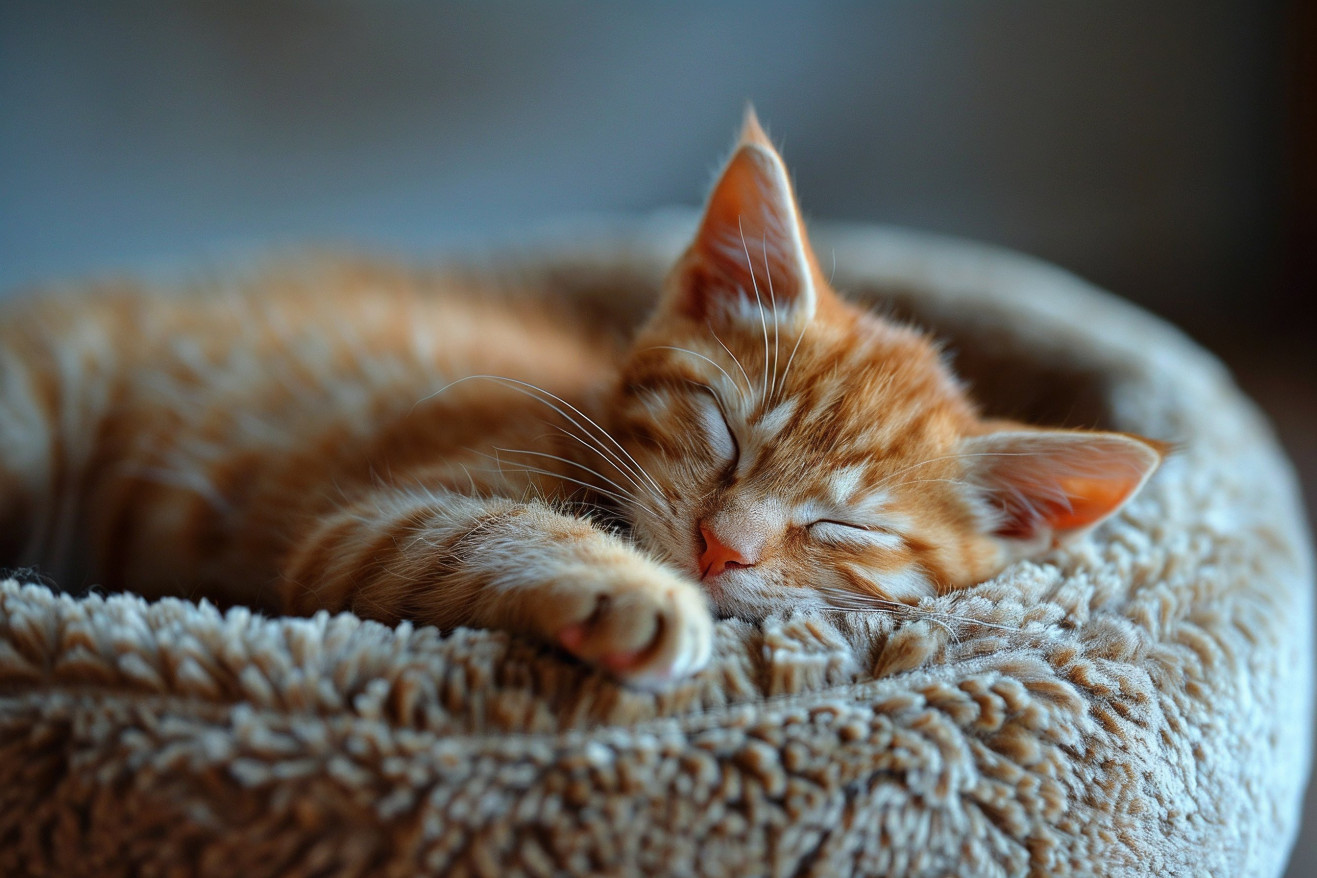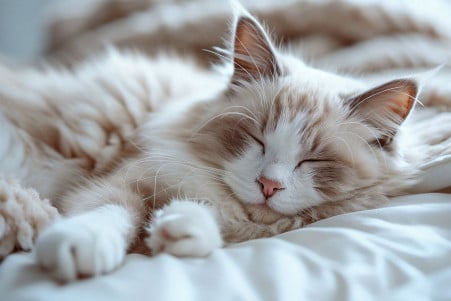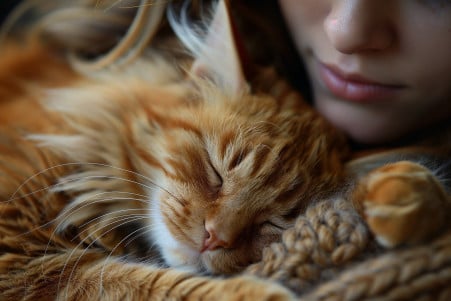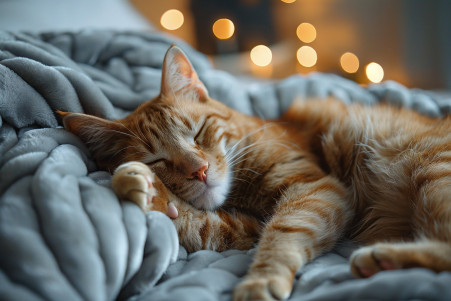How Much Do Kittens Sleep? Understanding Their Cute Nap Habits
19 March 2024 • Updated 19 March 2024

Kittens are known for being bundles of energy, but they also spend a lot of time napping. Just how much time do they need to sleep, though? Kittens need a lot of sleep - usually 16-20 hours a day until they're 6 months old - to make sure they get the rest they need to grow and develop.
To better understand how much kittens need to sleep and why it's so important to their health and well-being, we'll explore the findings of several studies by veterinarians, sleep researchers, and animal behaviorists.
These studies have looked at everything from kittens' sleep schedules to the biological factors that drive their need for so much sleep and what kitten owners can do to make sure their pets are getting enough rest. All of this information will help you make sure your kitten grows up to be a healthy, happy cat.
How much do kittens sleep?
Why Kittens Sleep So Much
Kittens sleep up to 22 hours per day, with the amount of time they spend sleeping decreasing from birth to around 18 hours a day by the time they are 3 months old, according to Perfect Fit. This prolonged sleep is necessary to support the growth of a kitten’s brain, muscles, bones, and immune system, according to veterinary professionals.
Kittens go through different sleep cycles, including REM (rapid eye movement) sleep, which helps them stay aware as their senses develop, says Vets4Pets. Kittens may twitch, move their faces, and vocalize during REM sleep, which is light sleep. They also experience deep, non-REM sleep, which is when they are most relaxed.
The reason for this sleep pattern can be found in the wild behavior of their ancestors, who slept during the day to conserve energy and avoid predators, according to BeChewy. By sleeping during the day, the vulnerable young wildcats were able to stay safe and hidden in their dens. Even though they are domesticated, kittens’ current sleep patterns are still influenced by this crepuscular (most active at dawn and dusk) behavior that they inherited from their predatory ancestors.
How to Set Up a Safe and Comfortable Sleep Environment for Kittens
Setting up a safe and comfortable sleep environment is important to ensure that kittens are able to get the sleep they need. As mentioned by Iams, kittens need a warm, safe space that is confined, like a small room or a bathroom. In addition, Basepaws suggests that cat beds, perches, and hiding spots can help kittens feel secure and sleep more soundly.
In addition, maintaining the right temperature, keeping the room dark, and providing soothing toys or supplements can help make a kitten's sleep environment more calming, according to Paw CBD. While kittens can sleep alone, it's important to make sure that the space is safe by kitten-proofing the area and ensuring that they have everything they need, including a bed, water, and a litter box, as pointed out by BeChewy.
In addition, setting up a bedtime routine, such as a play session and a small meal, can help kittens get ready for bed, according to Purina and Sheba UK. This can help kittens adjust to a regular sleep schedule as they get older.
How to Help Kittens Adjust to a Regular Sleep Schedule
Kittens may not sleep through the night at first because they are crepuscular, meaning they are most active at dawn and dusk, according to Jackson Galaxy. However, a consistent schedule that includes playtime, feeding, and quiet time can help kittens learn to change their sleep patterns, according to PetMD.
Spending an hour or more playing with kittens before bed can help them get more sleep at night, according to Purina. In addition, feeding kittens on a schedule, with meals no more than 6-8 hours apart, rather than free-feeding can help regulate their sleep, according to Pawp.
It's important to be patient and stick to a schedule when trying to change a kitten's sleep schedule, especially for younger kittens and older cats, according to BeChewy. However, with the right techniques and a little time, pet parents can help their cats adjust to a schedule that works for everyone.
Signs and Solutions of Sleep-Related Problems in Kittens
While kittens do sleep a lot, if your kitten seems excessively lethargic or has a sudden change in their sleep schedule, it could be a sign of an underlying health issue, according to the Clemmons Vet. Paying attention to your kitten's sleep and energy levels can help you catch potential issues like infections, parasites, or even nutritional deficiencies.
As Untamed explains, what you feed your kitten is also important to support their growth and development. Make sure your kitten is getting a diet that includes the right amounts of protein, fat, and carbohydrates. If their diet is unbalanced, it could lead to lethargy and sleepiness.
If your kitten is experiencing sleep disturbances or other symptoms that concern you, it's important to talk to your vet, according to PetMD. Catching and treating any health problems early will help ensure your kitten gets the sleep and care they need to grow and develop properly.
By catching and dealing with any potential sleep-related problems, you'll be able to make sure your kitten is getting the rest they need to be happy and healthy.
Conclusion: Accepting the Adorable Sleeping Patterns of Kittens
If you've ever asked yourself, "Do cats even sleep at night?" you're not alone. However, the answer is fairly straightforward - it depends on you, the pet parent. While cats are more active at night than humans, they aren't nocturnal. Instead, they're crepuscular, which means they're most active at dawn and dusk, just like the animals they're most likely to hunt.
To get your cat to sleep through the night, you'll have to adjust your schedule to theirs, which means you'll have to make sure they're getting enough playtime and feeding time. Jackson Galaxy suggests playing with your cat for an hour and a half before your bedtime and then feeding them their last meal of the day. This will help them get to the point of exhaustion. In addition, PetMD suggests not free-feeding your cat and instead feeding them three meals a day.
Kittens sleep a lot, especially when they're very young. In fact, they can sleep up to 22 hours a day in their first few weeks, and that number drops to about 18 hours a day by the time they're 3 months old, according to Untamed. This sleep is important because it helps them grow and develop. As PetMD notes, kittens sleep more than adult cats because they need the sleep to support their growth.
By learning about your cat's natural sleep patterns and making sure they have a consistent schedule, you can make sure your kitten or adult cat gets the rest they need.


